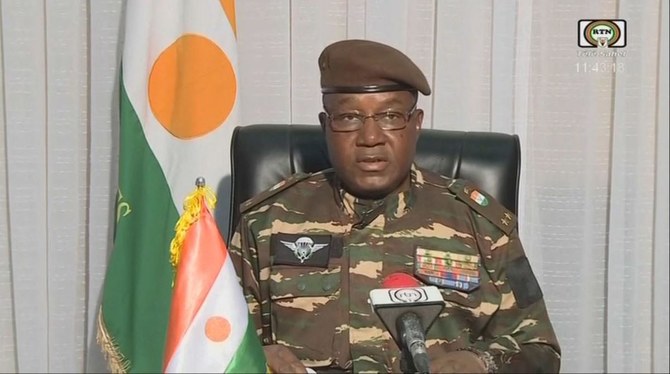NIAMEY, Niger: The general who led a coup in Niger took to state television Friday to ask for support for the takeover, two days after members of the military detained the democratically elected president and set off political chaos that could set back the nation’s fight against militants and increase Russia’s influence in West Africa.
As Gen. Abdourahmane Tchiani spoke, Niger state television identified him as the leader of the National Council for the Safeguarding of the Country, the group of soldiers who said they staged the coup.
Tchiani, who goes by Omar, said the country needed to change course to avoid “the gradual and inevitable demise” and thus he and others had decided to intervene.
“I ask the technical and financial partners who are friends of Niger to understand the specific situation of our country in order to provide it with all the support necessary to enable it to meet the challenges,” he said.
FASTFACT
France demanded the restoration of the democratically elected government in Niger saying it ‘does not recognize’ the putschists, and calling Mohammed Bazoum ‘sole president.’
Earlier, various factions of Niger’s military wrangled for power, according to an analyst and a Western military official. Tchiani’s appearance seemed to be an effort to show he was in charge, though the situation was still in flux.
A delegation from neighboring Nigeria hoping to mediate left shortly after arriving, and the president of Benin, nominated as a mediator by a regional body, had not arrived.
An analyst who has spoken with participants in the talks said that the presidential guard, which led the coup, was negotiating with the army about who should be in charge. The analyst asked not to be named because of the sensitive situation.
A western military official in Niger who is not authorized to speak to the media confirmed that the military factions were believed to be negotiating, and said that situation remains tense and all of the ingredients are on the table for it to erupt in fighting.
Speaking in Papua New Guinea, French President Emmanuel Macron condemned the coup as “completely illegitimate and profoundly dangerous for the Nigeriens, Niger and the whole region.” He said that he had spoken repeatedly with President Mohamed Bazoum, and that the detained leader is in good health.
French Foreign Minister Catherine Colonna told French media that there was still time to end what she described as an “attempted coup.”
“If you are hearing me speak of an attempted coup, that’s because we do not regard things as definitive,” French media quoted Colonna as saying. She also spoke of “possible exits if those responsible for this attempt hear the message from the international community.”
Niger is seen as the last partner in the West’s efforts to battle militants linked to Al-Qaeda and the Daesh group in Africa’s Sahel region, where Russia and the west have been vying for influence in the fight against extremism. France, which ruled Niger as a colony until 1960, has 1,500 soldiers in the country, who conduct joint operations with the Nigeriens.
On Thursday, several hundred people gathered in the capital, Niamey, and chanted support for the Russian private military group Wagner while waving Russian flags. Later, they burned cars and ransacked the headquarters of the president’s political party. “We’re fed up,” said Omar Issaka, one of the protesters.
“We are tired of being targeted by the men in the bush ... Down with the French people. We’re going to collaborate with Russia now,” he said.
The mutinous soldiers have not announced a leader and President Mohamed Bazoum, who was elected two years ago in Niger’s first peaceful, democratic transfer of power since its independence from France in 1960, has not resigned.
Some of the last public communications from the government included a defiant tweet by the president Thursday declaring that democracy would prevail and a call by the Foreign Minister Hassoumi Massoudou, on media outlet France 24, for Nigeriens to stand against the mutiny.
However, it’s unclear who’s involved in these dialogues, the nature of the discussions or how they’re proceeding.
Earlier this week, The Economic Community of West African States said it was sending Benin President Patrice Talon to lead mediation efforts, but as of Friday Talon was not in the country. During their first address to the nation Wednesday night, the mutineers urged “external partners” not to interfere.
Macron said France supports regional organizations, in particular ECWAS, “in the decisions that it will have to take — of mediation or condemnation and sanctions against the putschists if they make progress and finalize their plan.”
Analysts say the coup threatens to starkly reshape the international community’s engagement with the Sahel region.
On Thursday, US Vice President Kamala Harris, said the country’s “substantial cooperation with the Government of Niger is contingent on Niger’s continued commitment to democratic standards.”
Niger could lose millions of dollars in military aid and assistance, which the United States and European countries have recently poured in an attempt to help in the fight against Islamic extremism.
The United States in early 2021 said it had provided Niger with more than $500 million in military assistance and training programs since 2012, one of the largest such support programs in sub-Saharan Africa. The European Union earlier this year launched a $30-million military training mission in Niger.
The United States has more than 1,000 service personnel in the country.
















